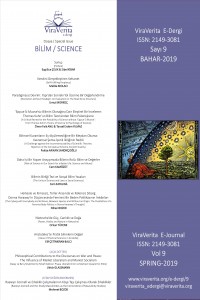Abstract
Friedrich Nietzsche geleneksel felsefi yaklaşımlardaki
özgürlüğün bilinçten, köleliğin bedenden kaynaklandığına ve çoğu modern
felsefedeki özgürlüğün yalnızca insani bir görüngü olduğuna yönelik düşünce
kalıplarının aksine köleliğin de özgürlüğün de bedensel süreçlerden türediğini
öne sürer. Bu makalede, Nietzsche’nin, insani etkinliği doğal süreçlerden
koparmamasına rağmen, nasıl olup da onu dışsal doğal yasaların belirlenimine
kurban etmeksizin yenilik, yaratma, özgürlük, fark ve etkinlik temelli bir
felsefe oluşturabildiği gösterilecektir. İlk olarak bitki, hayvan ve insan
ilişkisi üzerinden, Nietzsche’ye göre, tüm varlıklarda ortak olan kölelik ve
özgürlük süreçlerinin biriktirilen ve harcanan güçlerin bir sonucu olduğu iddia
edilecektir. Son olarak, insanın doğaya zararlı müdahalesini geri çevirmeye
yönelik geleneksel ekoloji anlayışlarının aksine, Nietzsche’nin verimlilik
merkezli felsefesinden tehlikeye düşmüş/tehlikeli bir yaşam olarak tehlikeye
düşmüş/tehlikeli bir ekosistemi olumlayan, sıradışı bir ekosistemler
anlayışının çıkabileceği iddia edilecektir.
References
- KaynakçaEmerson, R. W.(2016). Yaşamın İdaresi. Çev. Mustafa Tüzel. Ankara: Doğu Batı Yayınları.
- Kuperus G. (2017). “An Ecology of the Future: Nietzsche and Ecological Restoration”. In: Kuperus G., Oele M. (eds) Ontologies of Nature. Contributions to
- Phenomenology (In Cooperation with The Center for Advenced Research in Pheomenology), vol 92. Springer, Cham. 201-218.
- Lemm, V. (2016), “Is Nietzsche a Naturalist?”: Or How to Become a Responsible Plant”. Journal of Nietzsche Studies, Spring, Vol. 47, No. 1. 61-80.
- Nietzsche, F.(2011). Ahlakın Soykütüğü Bir Polemik. Çev. Zeynep Alagonya. İstanbul: Kabalcı Yayınevi.
- Nietzsche, F.(2008). Deccal. Çev. Oruç Aruoba. İstanbul: İthaki Yayınları.
- Nietzsche, F.(2005). “Gezgin ve Gölgesi”. Gezgin ve Gölgesi İnsanca, Pek İnsanca 2.Çev. Mustafa Tüzel. İstanbul: İthaki Yayınları.
- Nietzsche, F.(2001). İyinin ve Kötünün Ötesinde(Bir Gelecek Felsefesini Açış). Çev. Ahmet İnam. İstanbul: Yorum Yayınevi.
- Nietzsche, F.(2010). Putların Alacakaranlığı. Çev. Mustafa Tüzel. İstanbul. Türkiye İşbankası Kültür Yayınları.
- Nietzsche, F.( 2011ş). Şen Bilim (Ana metin 1). Çev. Ahmet İnam. İstanbul: Say Yayınları.
- Nietzsche, Friedrich. (1968). The Will to Power. Trans. Walter Kaufmann and R.J. Hollingdale, New York: Random House.
- Smith, D. W. (2003). “Deleuze and Derrida, Immanence and Transcendence: Two Directions in French Thought”. Between Deleuze and Derrida. Ed. P. Patton and J. Protevi. London and New York: Continuum. 46-66.
- Zimmerman, M. (2008). “Nietzsche and Ecology: A Critical Inquiry”. In Reading Nietzsche at the Margins, eds. Steven Hicks and Alan Rosenberg, 165-185. West Lafayette, IN: Purdue University Press.
Abstract
Contrary to the mindscapes in the traditional philosophical
approaches argue that freedom is originated from the conscious but the slavery
originated from the body, and mindscapes in the modern philosophy argue that
the freedom is only an human phenomena,
Friedrich Nietzsche asserts that both the freedom and the slavery are
rooted in the bodily processes. In this article, it will be shown how Nietzsche,
despite he doesn’t seperate human activity from natural processes, can create a
philosophical manner based on innovation, creation, freedom, difference and
activity without sacrificing human activity to the determination of external
natural laws. Firstly, through relationship among plant, animal and human, it
will be claimed that, according to Nietzsche, the processes of slavery and freedom, which are
common to all beings, are result of the stored up or used up forces. Secondly,
It will be argued that, unlike traditional ecological understandings desiring
to reverse human harmful intervention in nature, It would be derived from
Nietzsche's fruitfulness-centered philosophy that an extraordinary
understanding of ecosystems which embraces an endangered/dangerous ecosystem as
a kind of endangered/dangerous life.
References
- KaynakçaEmerson, R. W.(2016). Yaşamın İdaresi. Çev. Mustafa Tüzel. Ankara: Doğu Batı Yayınları.
- Kuperus G. (2017). “An Ecology of the Future: Nietzsche and Ecological Restoration”. In: Kuperus G., Oele M. (eds) Ontologies of Nature. Contributions to
- Phenomenology (In Cooperation with The Center for Advenced Research in Pheomenology), vol 92. Springer, Cham. 201-218.
- Lemm, V. (2016), “Is Nietzsche a Naturalist?”: Or How to Become a Responsible Plant”. Journal of Nietzsche Studies, Spring, Vol. 47, No. 1. 61-80.
- Nietzsche, F.(2011). Ahlakın Soykütüğü Bir Polemik. Çev. Zeynep Alagonya. İstanbul: Kabalcı Yayınevi.
- Nietzsche, F.(2008). Deccal. Çev. Oruç Aruoba. İstanbul: İthaki Yayınları.
- Nietzsche, F.(2005). “Gezgin ve Gölgesi”. Gezgin ve Gölgesi İnsanca, Pek İnsanca 2.Çev. Mustafa Tüzel. İstanbul: İthaki Yayınları.
- Nietzsche, F.(2001). İyinin ve Kötünün Ötesinde(Bir Gelecek Felsefesini Açış). Çev. Ahmet İnam. İstanbul: Yorum Yayınevi.
- Nietzsche, F.(2010). Putların Alacakaranlığı. Çev. Mustafa Tüzel. İstanbul. Türkiye İşbankası Kültür Yayınları.
- Nietzsche, F.( 2011ş). Şen Bilim (Ana metin 1). Çev. Ahmet İnam. İstanbul: Say Yayınları.
- Nietzsche, Friedrich. (1968). The Will to Power. Trans. Walter Kaufmann and R.J. Hollingdale, New York: Random House.
- Smith, D. W. (2003). “Deleuze and Derrida, Immanence and Transcendence: Two Directions in French Thought”. Between Deleuze and Derrida. Ed. P. Patton and J. Protevi. London and New York: Continuum. 46-66.
- Zimmerman, M. (2008). “Nietzsche and Ecology: A Critical Inquiry”. In Reading Nietzsche at the Margins, eds. Steven Hicks and Alan Rosenberg, 165-185. West Lafayette, IN: Purdue University Press.
Details
| Primary Language | Turkish |
|---|---|
| Journal Section | Articles |
| Authors | |
| Publication Date | May 31, 2019 |
| Submission Date | January 28, 2019 |
| Published in Issue | Year 2019 Issue: 9 |
ViraVerita E-Journal is licensed under a Creative Commons Attribution-NonCommercial 4.0 International License (CC BY-NC).

